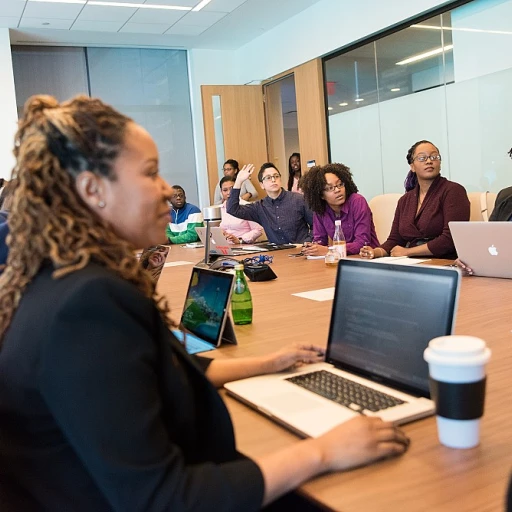
Key Responsibilities of a Training Coordinator
The Heart of Training Coordination
In any organization, the role of a training coordinator is crucial in shaping the skills and development of its workforce. At its core, the job description of a training coordinator involves organizing and managing training programs tailored to meet the specific needs of both individual employees and the company as a whole.
Coordinators are responsible for a wide range of tasks, from developing training materials to orchestrating training sessions that foster professional development. Effective management of these resources directly impacts the success and growth of the organization’s human resources and {...} to bridging skill gaps through innovative strategies in skill development.
The responsibilities extend beyond traditional boundaries, requiring skills in project management, instructional design, and learning development. Training coordinators not only manage but also work closely with teams to ensure each training session meets the set objectives.
Moreover, maintaining comprehensive training records and analyzing their outcomes to suggest improvements are fundamental tasks in a coordinator’s role, underscoring the importance of learning management systems in optimizing employee development.
Training coordinators fill a pivotal position in any company, acting as a bridge between existing capabilities and future competencies, making their responsibilities vital in nurturing a team-ready workforce.
Skills and Qualifications Needed
Essential Competencies for a Training Coordinator
When it comes to the role of a training coordinator, having a diverse set of skills is imperative. These professionals manage and organize training programs that maintain an organization's competitive edge. Let’s delve into the necessary skills and qualifications required to excel in this demanding job.- Coordination and Organizational Skills: The core responsibilities of a training coordinator revolve around administrating training sessions. This requires excellent coordination and organizational expertise to ensure that all components of a training program are streamlined and effective.
- Communication Abilities: Effective communication is crucial for a training coordinator, from liaising with human resources to delivering compelling training materials. Good communication facilitates better management and understanding across the team.
- Instructional Design: Training coordinators must possess a grasp of instructional design to create engaging and educational training materials. This is a specialized skill that helps in fulfilling the learning development needs of employees.
- Project Management Skills: Overseeing training programs often involves various stakeholders and resources. Therefore, possessing strong project management skills is a must to manage the diverse elements of any training program effectively.
- Adaptability: This role requires the ability to adapt to the changing landscape of employee training. The ability to swiftly respond to new training methods and technologies is invaluable.
- Experience in Learning Management Systems: Familiarity with different learning management systems can greatly enhance the efficiency of conducting training programs and tracking employee progress.
The Impact on High Potential Employees
Boosting Growth Through Effective Training
High potential employees thrive within an ecosystem that nurtures their growth, and the role of a training coordinator is pivotal in this process. It's more than just orchestrating training sessions; it's about crafting pathways for employees to advance in their careers. A well-designed training program can transform raw talent into a polished asset for the organization. Training coordinators design and implement programs that aim to enhance the skills and experience of employees. They are responsible for aligning these programs with the organization's goals, ensuring that high-potential employees are equipped with the necessary tools for development. This involves collaborating with human resources and management to identify the right resources required. Moreover, coordinators must excel in project management, as their job description often includes managing learning management systems and tailoring training materials to meet the specific needs of their company. They facilitate an environment where continuous learning and professional development are prioritized, enabling employees to reach their fullest potential. By designing effective training methods that cater to the individual learning styles, coordinators ensure that high-potential employees are not only knowledgeable but also innovative thinkers. In this context, unlocking potential goes beyond just attending workshops or seminars; it's about fostering an environment that challenges and engages employees. For an in-depth look into fortifying the capabilities of high-potential employees through executive coaching, read more about the role of an executive coach in achieving these goals. Ultimately, the impact of a training coordinator's work is evident in the team’s performance and the organization’s success. Through the strategic planning and implementation of training programs, coordinators play a crucial role in filling skill gaps and paving the way for future leaders.Challenges Faced by Training Coordinators
Overcoming Hurdles in Training Coordination
Training coordinators play a pivotal role in ensuring the successful development and implementation of training programs within an organization. However, this position comes with its own set of challenges that can impede the effectiveness of training sessions and the overall employee development process. Let's delve into some of the hurdles that coordinators may encounter in their work:- Resource Allocation: One of the primary challenges is effectively managing resources. Coordinators often face constraints in budgets, personnel, and materials necessary for executing comprehensive training programs. Balancing these elements requires adept project management skills and strategic planning.
- Keeping Up with Technological Advances: As technology evolves, so too must the strategies and methods used in training. Coordinators need to continuously update their learning management and instructional design skills to incorporate the latest training development trends and tools.
- Engagement and Motivation: Successfully engaging participants during training sessions can be a tough job. Coordinators must devise innovative methods to maintain interest and motivation, ensuring that the learning objectives are met and retained by employees.
- Customization and Personalization: With diverse learning needs across an organization, creating one-size-fits-all training materials can be ineffective. Coordinators must tailor programs to accommodate varied learning styles and career development pathways, ensuring a more personalized training experience.
- Assessment and Feedback: Gauging the effectiveness of training programs through consistent assessment and feedback mechanisms is crucial. Coordinators can struggle to develop and implement these measures effectively, impacting their ability to refine programs and improve overall outcomes.
- Time Management: Balancing multiple training projects simultaneously while fulfilling other responsibilities within the role requires exceptional time management abilities. Coordinators must prioritize tasks and remain flexible in the face of shifting organizational needs.
Strategies for Success
Implementing Effective Strategies for Success
Achieving success as a training coordinator involves a strategic approach that combines various responsibilities and skills. Here are some practical strategies and best practices to excel in this role:- Tailor Training Programs to Organizational Needs
- Understand the company's goals and objectives to design relevant training programs.
- Collaborate with management and employee teams to identify key areas that require development.
- Harness Technology in Learning and Development
- Utilize learning management systems (LMS) to streamline training sessions and track progress.
- Incorporate e-learning tools and instructional design to cater to different learning styles.
- Effective Resource Management
- Efficiently allocate and manage resources, such as training materials, venues, and human resources.
- Keep updated with the latest resources and technologies in training coordinator job descriptions.
- Focus on Continuous Professional Development
- Stay abreast of the latest trends and methods in professional training and development.
- Engage in learning development opportunities to enhance your skills and qualifications.
- Promote Team Collaboration and Communication
- Foster an environment of open communication between coordinators and other departments.
- Encourage feedback and support from teams to refine programs and strategies.
- Utilize Feedback to Improve Training Methods
- Gather and analyze feedback from training sessions to understand strengths and areas of improvement.
- Regularly update training programs based on feedback and new insights.
- Master Project Management Techniques
- Apply project management principles to coordinate complex training projects efficiently.
- Develop a timeline and checklist to ensure timely delivery of training objectives.
Future Trends in Training Coordination
Embracing the Future: Innovations in Training Coordination
The role of a training coordinator is continually evolving, requiring adaptability to new trends and technologies. With advancements in digital learning platforms and a growing emphasis on personalized professional development, staying ahead is crucial for coordinators.- Digital Transformation in Training Programs: The integration of learning management systems and various training methods has transformed how training sessions are delivered. These technological tools allow for a more customized learning experience, matching the unique skills and development needs of each employee.
- Data-Driven Insights: Utilizing data analytics in training coordination could prove invaluable. By assessing data on employee engagement and training effectiveness, coordinators can better tailor programs to meet organizational goals and improve employee productivity.
- Focus on Soft Skills Development: Increasingly, organizations recognize the importance of soft skills alongside technical capabilities. Training coordinators need to develop programs that balance these aspects, highlighting their importance in collaborative work environments.
- Remote Work Adaptations: With the rise of remote work, coordinators must adapt to new ways of delivering training. This includes harnessing virtual training sessions and embracing flexible learning schedules that cater to diverse time zones and work arrangements.
- Sustainability and Social Responsibility: Modern organizations are also thinking about sustainability in training. Coordinators might explore green initiatives or socially responsible projects as part of their training development efforts, aligning with the company's broader mission.
- Lifelong Learning Culture: Finally, embedding a culture of lifelong learning within the organization enhances the role of training coordinators. Encouraging continuous learning and development not only benefits employees but also ensures the company remains competitive in a rapidly changing business landscape.













